The last two presidential elections both came down to a relatively small number of votes, and in both elections the integrity of the voting process has been called into question. With the upcoming election looking to be similarly
close, the time has come to ask the questions: what happened in 2000 and 2004; what has changed since; and what can be done to ensure a fair and honest tabulation of votes in 2008?
STEALING AMERICA: Vote by Vote brings together behind-the-scenes perspectives from the U.S. presidential election of 2004 – plus startling stories from key races in 1996, 2000, 2002 and 2006. Unbiased and nonpartisan, the film sheds light on a decade of vote counts that don’t match votes cast – uncounted ballots, vote switching, undervotes and many other examples of election totals that warrant serious investigation.
Dorothy Fadiman has been producing media with a focus on social justice and human rights since 1976. Her film subjects have ranged from progressive education in WHY DO THESE KIDS LOVE SCHOOL? (produced with 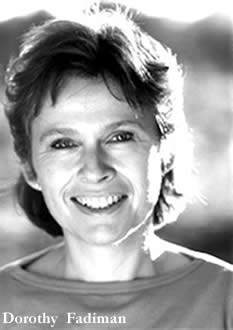 KTEH-TV) and progressive change for women in some of the least developed villages of India in WOMAN by WOMAN: New Hope for the Villages of India (produced with KQED-TV); to a three-film series on reproductive issues and a five-film series on AIDS in Ethiopia including From RISK to ACTION: Women and HIV/AIDS in Ethiopia. Fadiman has won more than 50 major awards, including an Emmy for her 1995 production FROM DANGER to DIGNITY: The Fight for Safe Abortion, and an Oscar nomination for Best Short Subject, as well as the Gold Medal from the Corporation for Public Broadcasting for her 1992 production WHEN ABORTION WAS ILLEGAL: Untold Stories. Her films have been broadcast on PBS, and have been screened in many international venues. Fadiman’s new book, PRODUCING with PASSION: Making Films That Make a Difference was released in June, 2008.
KTEH-TV) and progressive change for women in some of the least developed villages of India in WOMAN by WOMAN: New Hope for the Villages of India (produced with KQED-TV); to a three-film series on reproductive issues and a five-film series on AIDS in Ethiopia including From RISK to ACTION: Women and HIV/AIDS in Ethiopia. Fadiman has won more than 50 major awards, including an Emmy for her 1995 production FROM DANGER to DIGNITY: The Fight for Safe Abortion, and an Oscar nomination for Best Short Subject, as well as the Gold Medal from the Corporation for Public Broadcasting for her 1992 production WHEN ABORTION WAS ILLEGAL: Untold Stories. Her films have been broadcast on PBS, and have been screened in many international venues. Fadiman’s new book, PRODUCING with PASSION: Making Films That Make a Difference was released in June, 2008.
Ion Sancho is a State Certified Supervisor of Elections. In the 2000 Presidential recount, Sancho was chosen to lead the Florida hand count of ballots in dispute in Miami-Dade County. Sancho has been on National Public Radio, is quoted in the New York Times, the Washington Post, St. Petersburg Times and appears in the documentary Hacking Democracy. Sancho is noted for facilitating a voting security experiment, in which a hacker successfully hacked into Sancho’s county’s Diebold voting machines.
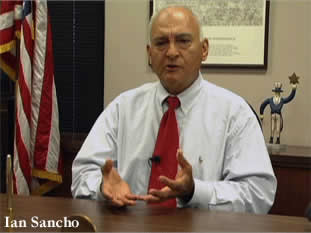 Bijan Tehrani: My first question is for Dorothy. How did you come up with the idea for Stealing America; Vote by Vote, and what motivated you to make it?
Bijan Tehrani: My first question is for Dorothy. How did you come up with the idea for Stealing America; Vote by Vote, and what motivated you to make it?
Dorothy Fadiman: I was working at the polls in Florida, and I was warned by the attorney who was preparing us at the polls that there was a phenomenon happening in the pre-voting in which people were voting for Kerry and getting Bush on the screen. I thought that was strange and interesting, and indeed throughout the day there were reports of this happening throughout the area where I was working. One by one I began hearing more reports that people who were working in south Florida were having the same experience. When I got back to California I began to do research, and found out that this vote switching was happening in thirteen different states, in which people were voting for Kerry and getting Bush on the screen. When I lifted that rock of information and looked underneath, I found a swarm of irregularities across the country; exit poll discrepancies, long lines, votes not being counted, and many more things. And so I decided to make a film about the whole phenomenon, which indicated that something had gone seriously wrong in the 2004 election.
Bijan: How challenging was making this film, as far as finding people to talk to?
Dorothy: Actually I would not use the world challenging. Making it was challenging. Getting it to work structurally and dramatically, and in terms of information, was challenging. But as far as getting people to come forward, people 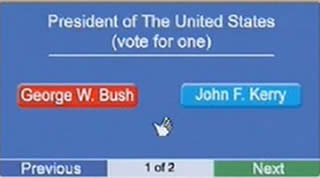 from a wide spectrum of backgrounds who were willing, able, and interested in talking, was not difficult, because there were many people who felt they never had a chance before to speak out.
from a wide spectrum of backgrounds who were willing, able, and interested in talking, was not difficult, because there were many people who felt they never had a chance before to speak out.
Bijan: This question is for Ion Sancho; watching this film, do you think it will bring disappointment to the voters, many who will now question whether their votes were really counted? 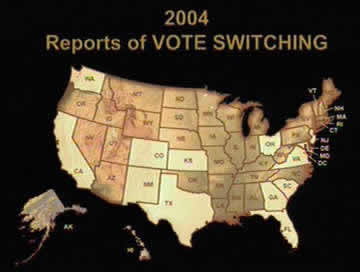 Ion Sancho: The reaction that I am seeing is not disapointment, but something more akin to anger, to surprise, and to a motivation to do something about this. Americans believe that the right to vote is basic to self government, and we have assumed that despite our prior history of voter fraud – because American does have a history of electoral problems going all the way back to the Colonial period, which is why we invented the lever machine and the Australian secret ballot- the current system was honorable. All of these were reforms intended to counter the corruption of election officials and post WWII we thought this was no longer part of the process. But as an election official in for twenty years in Leon country, one of the things that I became aware of almost instantly was that thousands of votes in Florida were never being counted. This had to do with not providing enough equipment for voters, not telling them what the rules were so they were making bad decisions. Quite frankly, this all came to a head in the 2000 election when the state authorities, run by partisan election officials – for example, Secretary of State Katherine Harris was a Republican and the Secretary of State and the Chair person for the Bush election campaign- really made a point not to count Floridians’ votes. This basically led to the awareness in this country that something must be done to ensure that we had an election process that really did count every American’s vote.
Ion Sancho: The reaction that I am seeing is not disapointment, but something more akin to anger, to surprise, and to a motivation to do something about this. Americans believe that the right to vote is basic to self government, and we have assumed that despite our prior history of voter fraud – because American does have a history of electoral problems going all the way back to the Colonial period, which is why we invented the lever machine and the Australian secret ballot- the current system was honorable. All of these were reforms intended to counter the corruption of election officials and post WWII we thought this was no longer part of the process. But as an election official in for twenty years in Leon country, one of the things that I became aware of almost instantly was that thousands of votes in Florida were never being counted. This had to do with not providing enough equipment for voters, not telling them what the rules were so they were making bad decisions. Quite frankly, this all came to a head in the 2000 election when the state authorities, run by partisan election officials – for example, Secretary of State Katherine Harris was a Republican and the Secretary of State and the Chair person for the Bush election campaign- really made a point not to count Floridians’ votes. This basically led to the awareness in this country that something must be done to ensure that we had an election process that really did count every American’s vote.
Bijan: In looking at this film, I get the impression, which is unfortunately quite true, that in most cases it has been Republicans who have used different systems to their benefit, in terms of vote switching and everything else. How do you see that from the perspective of Republicans who will be watching this film?
Ian: Well, I do think that the film tries to point out in its introduction that American’s electoral process has always been subjected to this winner take all, bare knuckled 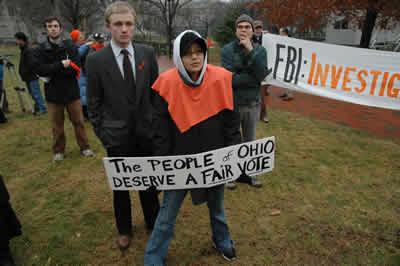 political struggle, that has really led to an ends-justifies-the-means philosophy. For example, there is a scene were Stephen Colbert catches Mr. Kennedy with a question about his Uncle stealing the election with Mayor Daley’s help. Historically — I am aware of this being a student of elections — this is a long-term problem. Since the Republicans have been in control of the levers of power the film focuses on discrepancies in the 2000 and 2004 elections. But Ms. Fadiman does an excellent job in showing the Ohio election official who stated that when the Democrats were in control they did the same thing. That justifies the idea with the current crop of Republicans that this is ok. This is certainly not ok, and the larger point is that no one in the country should be doing this. You really must keep history in perspective.
political struggle, that has really led to an ends-justifies-the-means philosophy. For example, there is a scene were Stephen Colbert catches Mr. Kennedy with a question about his Uncle stealing the election with Mayor Daley’s help. Historically — I am aware of this being a student of elections — this is a long-term problem. Since the Republicans have been in control of the levers of power the film focuses on discrepancies in the 2000 and 2004 elections. But Ms. Fadiman does an excellent job in showing the Ohio election official who stated that when the Democrats were in control they did the same thing. That justifies the idea with the current crop of Republicans that this is ok. This is certainly not ok, and the larger point is that no one in the country should be doing this. You really must keep history in perspective.
Bijan: Dorothy, I think that your film is brave, and that you made it at the right time. Do you think it will have an affect on the mainstream media, who always avoid dealing with this issue?
Dorothy: What I am seeing, which is very exciting, is that there has been a very open response from the larger community to viewing the film, appreciating the film, and wanting to interview us. We have been with Fox News, CNN, Agence France; we have been with a number of different mainstream opportunities. On the whole, the questions have been provocative but supportive, and not confronting and challenging. What I am experiencing is a shift in the media from not wanting to touch the issue, exactly as you described, to being genuinely curious and wanting somehow to get it right.
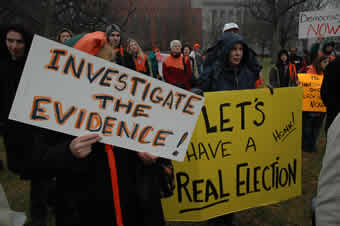 Bijan: Ion, what does this film do as far as helping to correct problems of the voting machines, and how will it influence this year’s election?
Bijan: Ion, what does this film do as far as helping to correct problems of the voting machines, and how will it influence this year’s election?
Ion: Well, the first step in correcting the problem is getting people to understand the dimensions of the problem. I think that what we are seeing is that the timing of this was right. People were blindsided in the 2000 election, and in the 2004 election Senator Kerry conceded in Ohio before the vote counting was even complete, really derailing any kind of governmental reaction. But what that spawned is a grassroots election integrity movement across the country, which I believe is the fastest social political movement in the US today. It is the awareness of people like yourselves, who point out that this film exists and tell viewers how compelling and challenging it is to conventional political wisdom, that will make the media and the American public realize that we can make the kinds of changes that we need. These include having non-partisan election administration, having paper ballots that can be hand counted or at least audited, and verifying that all votes are tallied as American citizens have cast them.
Dorothy: I want to add that the last scene in the film, where one citizen, the woman named Pat, gets it in her mind that she can make a difference. She reaches out to her community, her community reaches out to other communities, and they work together, and actually draft and support legislation. In the film the Governor of New Mexico signs legislation for paper ballots, which began with one woman.
Bijan: I decided to watch the film with a teenager who isn’t involved in politics, and an elderly woman who is a soap opera addict, and a man from Germany traveling in the US, in order to field different reactions to the film. Amazingly, at first they were totally indifferent to the themes of the film; they were talking about other issues. As the movie was going on they stopped talking, started paying attention, and at the very end they were totally into the film. The way that you build up the film is very interesting, and moves the viewer through the film in the manner of a fiction film in its climax.
Dorothy: I just want to say what a gift it is for you to tell me this, because we have just finished the film, and you are one of our first reviewers, and one of the first people that has actually shown it to a feedback session.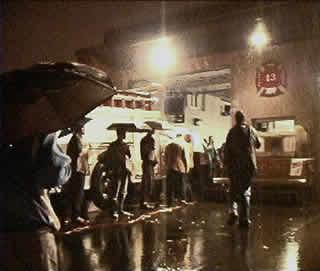
Bijan: How did you come up with the structure of the film? Was it during the editing process?
Dorothy: What I do when I am making the film is that I have feedback session after feedback session. This is why I love what you said, because I bring people of all ages, socio-economic groups, of all interests including Republicans, and a wide range of people. As the film evolved people would give me feedback, telling me what works and what is too partisan. As a result of these feedbacks, I decided to build the film in chapters because there was so much information and it was so complex and multidimensional that the only way people could digest it was by creating chapters.
Bijan: Don’t you think showing this film on college campuses is very important during these next few months?
Dorothy: I’d go further. I’d say it is crucial.
Bijan: Has anything been done to make this happen?
Dorothy: We have a college campus screening coordinator, and he is organizing to show it on college campuses throughout the country, and that is really the hope of the future.

